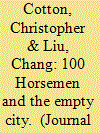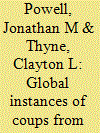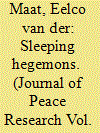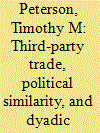|
|
|
Sort Order |
|
|
|
Items / Page
|
|
|
|
|
|
|
| Srl | Item |
| 1 |
ID:
103720


|
|
|
|
|
| Publication |
2011.
|
| Summary/Abstract |
We present game theoretic models of two of the most famous military bluffs from history. These include the legend of Li Guang and his 100 horsemen (144 BC), and the legend of Zhuge Liang and the Empty City (228 AD). In both legends, the military commander faces a much stronger opposing army, but instead of ordering his men to retreat, he orders them to act in a manner consistent with baiting the enemy into an ambush. The stronger opposing army, uncertain whether it is facing a weak opponent or an ambush, then decides to flee and avoid battle. Military scholars refer to both stories to illustrate the importance of deception in warfare, often highlighting the creativity of the generals' strategies. We model both situations as signaling games in which the opponent is uncertain whether the general is weak (i.e. has few soldiers) or strong (i.e. has a larger army waiting to ambush his opponent if they engage in combat). We then derive the unique Perfect Bayesian Equilibrium of the games. When the probability of a weak general is high enough, the equilibrium involves mixed strategies, with weak generals sometimes fleeing and sometimes bluffing about their strength. The equilibrium always involves the generals and their opponents acting as they did in the historical examples with at least a positive probability. When the probability of a weak general is lower (which is reasonable given the reputations of Li Guang and Zhuge Liang), then the unique equilibrium always involves bluffing by the general and retreat by his opponent.
|
|
|
|
|
|
|
|
|
|
|
|
|
|
|
|
| 2 |
ID:
103713


|
|
|
|
|
| Publication |
2011.
|
| Summary/Abstract |
Over the past two decades, a new international regime of individual criminal accountability has emerged as a dominant regulatory mechanism to address gross human rights violations. At the same time, states are still pursuing claims against each other for human rights abuses in international courts. These two concepts of responsibility - individual and state - are not only fundamentally at odds with one another; they also exclude the third, critical aspect of political accountability - societal responsibility for past violence. This triple accountability - of individual perpetrators who committed the crimes, of the state that hired them to implement the practices, and of society that supported or tacitly approved repressive state policies - is a complex political condition that the current transitional justice framework is ill equipped to deal with. Individualization of accountability serves the retributive purpose of justice, but it is woefully inadequate to address the collective political ideologies that made such heinous crimes possible in the first place. Domestic elites can be enthusiastic supporters of individual human rights trials - not because they want to bring about justice, but because they want to shield the state and society from complicity in past crimes. To address this paradox, this article presents a new framework of post-conflict accountability that includes individual, state, and societal responsibility for human rights violations. The framework is then applied to the case of Serbian responsibility for war crimes committed in Bosnia.
|
|
|
|
|
|
|
|
|
|
|
|
|
|
|
|
| 3 |
ID:
103724


|
|
|
|
|
| Publication |
2011.
|
| Summary/Abstract |
Once considered a 'hot topic' among scholars, research on coups d'état has waned in recent years. This decline is surprising given that 7 coups have happened between January 2008 and December 2010, bringing the last decade's total to almost three dozen. One explanation for the lack of coup research is the absence of a temporally and spatially comprehensive dataset to test theories. Also absent is a discussion of what makes coups distinct from other forms of anti-regime activity. This article seeks to remedy these problems. The authors present a new dataset on coups from 1950 to 2010. They begin by explaining their theoretical definition and coding procedures. Next, they examine general trends in the data across time and space. The authors conclude by explaining why scholars studying a variety of topics, including civil wars, regime stability, and democratization, would benefit by paying closer attention to coups.
|
|
|
|
|
|
|
|
|
|
|
|
|
|
|
|
| 4 |
ID:
103712


|
|
|
|
|
| Publication |
2011.
|
| Summary/Abstract |
It is very common to analyse the factors associated with the onset and continuation of civil wars entirely separately, as if there were likely to be no similarity between them. This is an overstatement of the theoretical position, which has established only that they may be different (i.e. less than perfectly correlated). The hypothesis that the explanatory variables are the same is not theoretically excludable and is empirically testable, both for individual variables and for combinations of them. Starting from this approach yields a rather different picture of the factors associated with the continuation of civil wars, because the relatively small sample size means that confidence intervals on individual coefficients are wide in this case. It is shown here that country size, mountainous terrain and (in most datasets) ethnic diversity seem significant for the continuation of civil wars, starting from the null hypothesis that variables affect onset and continuation probabilities identically, rather than entirely independently. One variable that affects onset and continuation significantly differently is anocracy, which we find to matter only for onset. Civil war is more likely if it occurred two years previously, as well as one year previously, which indicates that wars are more likely to restart after only one year of peace, and also more likely to stop in their first year. The combined model strengthens the result that ethnic diversity matters (it is consistently significant across datasets, whereas it is not when onset is analysed separately), although in the UCD/PRIO dataset it is significant only for onset. By contrast, if continuation is analysed independently, virtually nothing is significant except a pre-1991 dummy and a dummy for civil war two years previously.
|
|
|
|
|
|
|
|
|
|
|
|
|
|
|
|
| 5 |
ID:
103723


|
|
|
|
|
| Publication |
2011.
|
| Summary/Abstract |
The major historical issue in the Israeli-Arab/Palestinian conflict is the causes for the 1948 Palestinian exodus. Among the Israelis/Jews there are two main narratives regarding this issue: the Zionist one - the refugees fled, for various reasons; and the critical one - some fled while others were expelled by the Jewish/Israeli security forces. This article explores the way the Israeli/Jewish historical memory (i.e. the Israeli/Jewish research community) related to this historical issue from 1949 until 2004. According to the findings, until 1957 this memory exclusively presented the Zionist narrative. However, from 1958 to 1976 this Zionist trend largely continued but was accompanied by considerable critical studies. Later, from 1977 to 2004, this memory was characterized by the almost exclusive adoption of the critical narrative (with major increase in its significance since 1988). These findings contradict the way the literature relates to this memory as almost exclusively Zionist until the late-1980s. Other aspects of this memory are also discussed, such as the explanations for its characteristics, the significance of non-academic scholars, the contribution of scholars who reside externally to the given country, state-research community relations, the influence of present interests on the portrayal of the past, and gender issues. The findings have theoretical implications for collective and historical memories.
|
|
|
|
|
|
|
|
|
|
|
|
|
|
|
|
| 6 |
ID:
103718


|
|
|
|
|
| Publication |
2011.
|
| Summary/Abstract |
It is not clear why some territorial transgressions lead to intervention by the international community and others do not. As most territorial transgressions lead to a reaction from the international community but a few, however, do not, this study examines the main determinants for non-intervention by capable members of the international community, following violation of the territorial integrity norm by a deviant state. This article focuses on which characteristics of the norm-transgressing state, the conflict, and the state capable of enforcing the norm affect the occurrence of non-intervention. This comparative study examines six major alleged transgressions of the territorial integrity norm - the occupation of Tibet, the Suez crisis, the 1967 six-day war, the Indonesian occupation of East Timor, the Moroccan occupation of the Western Sahara, and the 1989 Gulf crisis - using a multi-methodological approach based on qualitative methods, most notably fuzzy-set Qualitative Comparative Analysis. Analysis reveals that the absence of high security costs to the hegemon in combination with (a) strategically important security relations between the transgressor and the hegemon or (b) absence of military and economic vulnerability are generally necessary and sufficient for non-intervention.
|
|
|
|
|
|
|
|
|
|
|
|
|
|
|
|
| 7 |
ID:
103714


|
|
|
|
|
| Publication |
2011.
|
| Summary/Abstract |
Why and when do states take the burden upon themselves to send peacekeepers into a civil war, rather than relying on intergovernmental organizations to do so? While there are a few empirical studies on the conditions under which the UN sends peacekeeping missions, no such analyses of state-conducted peacekeeping exist. In this study, a theoretical framework on state-conducted peacekeeping in civil wars is developed and empirically tested. Not surprisingly, when acting outside international organizations, states are able to take their own interests directly into account and select those civil wars to which they send peacekeepers accordingly. States' interests play a much greater role here than, for example, the interests of the major powers do for UN peacekeeping. When states send peacekeepers they are more likely to choose former colonies, military allies, trade partners, or countries with which they have ethnic ties. Yet, this does not mean that state-conducted peacekeeping occurs only where states see their own interests. Contrary to conventional wisdom, states also provide peacekeeping to 'tough' cases, the most challenging civil wars. These are long, ethnic wars. This tendency for states to provide peacekeeping holds when civil wars produce dire effects on civilians. States are more likely to send peacekeepers into civil wars that kill or displace many people. Finally, states react to opportunities: the more previous mediation attempts, the higher the chances for state-conducted peacekeeping.
|
|
|
|
|
|
|
|
|
|
|
|
|
|
|
|
| 8 |
ID:
103722


|
|
|
|
|
| Publication |
2011.
|
| Summary/Abstract |
Previous research has identified economic and political factors that can contribute to the outbreak and the duration of armed conflicts. However, the psychological factors that may play a role in conflict escalation and duration have received less attention. Adopting a psychological perspective, the present study aims to investigate the role of death awareness in the context of an armed conflict. To this aim, basic assumptions derived from Terror Management Theory (TMT) were examined in an African civil war context. According to TMT, people manage awareness of inevitable death by increased striving for self-esteem and increased adherence to their cultural values. Students from the University of Abidjan (Ivory Coast), located in the pro-governmental part of the country, were randomly assigned to a mortality salience or a control condition and completed measures of self-esteem and government/army support. As expected, reminding participants of their possible death during the ongoing conflict exacerbated self-esteem, as well as support for the actions of the government and its army, compared to a control condition. Given that mortality is chronically salient in the context of a civil war, these effects can lead to conflict intensification by increasing not only each side's support for their leaders, but also the value that members of confronted sides attribute to themselves. The findings are discussed in terms of the role of mortality salience in conflict escalation and the importance of carefully dealing with the past in post-conflict societies.
|
|
|
|
|
|
|
|
|
|
|
|
|
|
|
|
| 9 |
ID:
103716


|
|
|
|
|
| Publication |
2011.
|
| Summary/Abstract |
A growing literature maintains that trade is pacifying to interstate relations, and recent work on trade networks suggests that this pacifying effect extends to indirect trade ties. In this article, it is argued that third-party trade can also have an aggravating effect within dyads, by threatening to alter the dyadic balance of capabilities. For the state trading outside the dyad, trade gains from third parties provide incentives to demand change in the dyadic status quo and finance violent conflict when dyadic disputes arise. For the state whose dyadic partner trades with third parties, potential for the trading state to grow increasingly more powerful encourages action to prevent erosion of the non-trading state's relative power. These aggravating effects are conditional, however, on dyadic political similarity, as concerns for relative capability shifts decrease when states do not view their dyadic partners as threats. Hypotheses derived from this argument are tested on data spanning 1885 to 2000. Results support these hypotheses, suggesting important implications for the literature on trade and conflict. When extending the relative gains arguments associated with realism beyond the dyad, a clear, yet conditional, aggravating effect of third-party trade emerges.
|
|
|
|
|
|
|
|
|
|
|
|
|
|
|
|
|
|
|
|
|